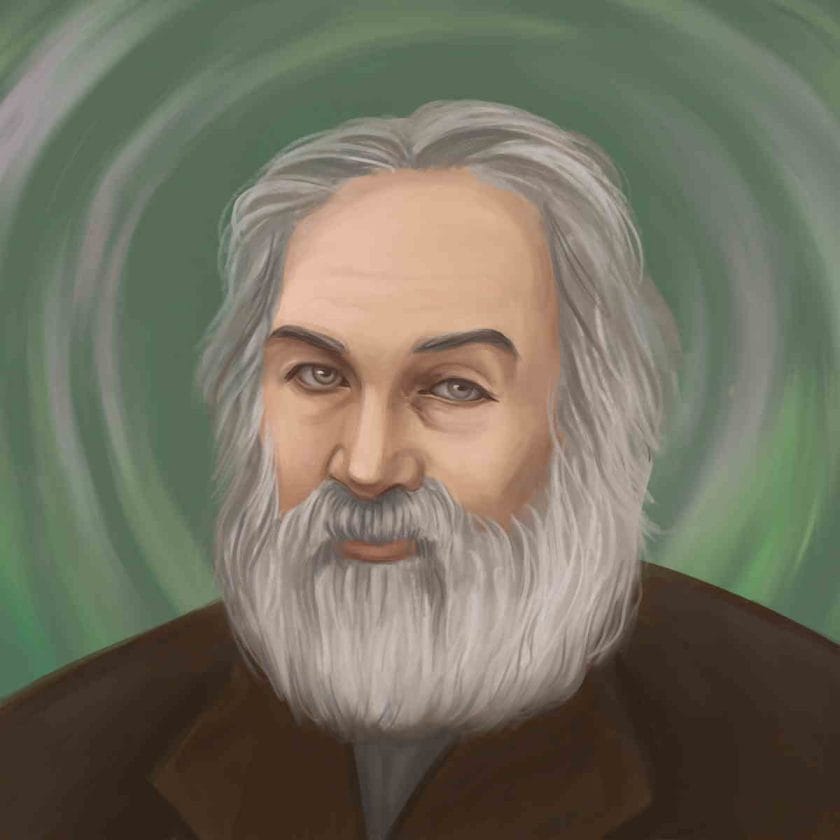A Noiseless Patient Spider Metaphor
Walt Whitman was born to parents Louisa Van Veslor and Walter Whitman Sr., in West Hills, Long Island, New York. Throughout his early life, he jumped from unlike jobs, learning almost the American experience. His best-known work is the collection of personal poems, Leaves of Grass. Its publication in 1855, while he was living in Brooklyn, New York, is seen as a turning point in American verse. (It was eventually published in six editions.)
His piece of work is situated between Transcendentalism and Realism. He died at the age of 72 in Camden, New Jersey, and was buried at Harleigh Cemetery. Today, Walt Whitman is considered to exist one of the most popular and influential poets of all time, especially in America.

When writing well-nigh Whitman'sLeaves of Grass,fellow American poet Ralph Waldo Emerson referred to the collection as:
"the wonderful gift of Leaves of Grass. I observe it the most boggling piece of wit and wisdom that America has yet contributed."
Although this list covers ten of the best Whitman poems, there are many others that readers may find themselves interested in. These include individual poems like 'Crossing Brooklyn Ferry,' 'When Lilacs Final in the Dooryard Blossom'd, and groups of poems like the'Calamus'poems and the collection of forty-three Ceremonious War poems known as Drum-Taps.

Out of the Rolling Ocean
Out of the rolling ocean the crowd came a drop gently to me,
Whispering,I love you, earlier long I dice,
I have travell'd a long way simply to expect on you to touch yous,
For I could not die till I once look'd on y'all,
For I fearfulness'd I might afterward lose yous.
In this lesser-known piece, Walt Whitman describes the last words of a narrator'southward dying lover and his assurances they will find i another once more in the rolling ocean. The poem begins with the speaker telling his reader that someone, like a single drib from the bounding main, "came" to him. This is something that seems miraculous to the speaker. He is grateful to accept found someone to spend his last moments with. He is part of the circle of life and death, and by the terminate of the verse form, the fear associated with entering into the afterlife has prodigal.
Me Imperturbe
Me imperturbe, standing at ease in Nature,
Primary of all, or mistress of all—ataraxy in the midst
of irrational things,
Imbued as they—passive, receptive, silent as they,
Finding my occupation, poverty, notoriety, foibles,
crimes, less important than I thought;
This poem is about a speaker's dedication to maintaining his current mental and emotional land of beingness in the face of the challenges the world throws at him. As is common within his verse, it is through nature that Walt Whitman'due south speaker finds himself. The natural earth allows him to milkshake off some of the clutter of his everyday life and gratuitous his mind. The experience also opens his mind enough so that he realizes that aught he does, in the mode of jobs or careers, would put his true self at risk.
O Helm! My Captain!
This piece is possibly Whitman's most popular and well-analyzed. It is an elegy devoted to a deceased "Captain." He was a great leader and someone, the speaker, knew the world would miss. At the beginning of the poem, the helm-less ship sails home to port and are greeted past a jubilant crowd. Here are a few lines:
O Captain! my Helm! our fearful trip is done,
The ship has conditions'd every rack, the prize nosotros sought is won,
The port is most, the bells I hear, the people all exulting,
While follow eyes the steady keel, the vessel grim and daring;
Only O heart! heart! heart!
O the bleeding drops of red,
Where on the deck my Captain lies,
Fallen cold and dead.
The speaker wishes the captain were at that place to run across and feel the excited people onshore and wills his body to rise up from under the deck. It is well known that this piece was written presently after Abraham Lincoln's expiry (near the end of the American Civil State of war) and that he is intended to be the dead captain.
I Sing the Body Electric
I sing the body electric,
The armies of those I love engirth me and I engirth them,
They will not let me off till I go with them, answer to them,
And discorrupt them, and accuse them full with the charge of the soul.
Walt Whitman'due south speaker compares the trunk and the soul in this piece. He comes to the conclusion that they are much more similar than they are different. He moves through unlike images of various kinds of bodies. At that place is a dumbo and thrilling list of images in the second function of the poem that outlines why the body is a cute matter.
He speaks on both male and female person bodies likewise. The poem gets more than specific towards the finish when Whitman talks about one man, a farmer, who has five sons. He also places himself in the body of a slave auctioneer, whose job it is to sell black bodies. All parts of these bodies he speaks on are parts of the soul.
I Dream'd in a Dream
I dream'd in a dream
I saw a city invincible to the attacks of the
whole of the residual of the earth,
I dream'd that was the new city of Friends,
This short, lesser-known poem is a depiction of the world as it might be. It explores themes of honey, human nature, and the future of humanity. The speaker describes, in eight short lines, a dream he had. In this dream, he saw a urban center that was based entirely on the principles of dearest. Every decision the men and women inside its bounds fabricated was with beloved in mind. Nothing could disrupt the functioning of this place, nor was there anyone inside it that expressed selfish needs or wants.
The Ship Starting
Lo, the unbounded sea,
On its breast a ship starting, spreading all sails, carrying fifty-fifty
her moonsails.
In this six-line poem, Whitman creates an image of a ship starting out to run across dangerous waters. He uses personification to describe the waves and the body of water. It feels competitive, as though it is fighting back confronting the send to show its strength. At the same time, it pushes the transport forward and allows the transport to wing its moonsail and pennant. Whitman emphasizes the motility of the waves in the final lines of 'The Ship Starting.' They twist and plow, seen through the repetition of words starting with "due south."
Sometimes With the One I Beloved
Sometimes with one I love I make full myself with rage for fright I effuse unreturn'd love,
But now I recall there is no unreturn'd love, the pay is sure i manner or another,
This brusk and powerful love poem speaks on the benefits that ane can get from simply being in dear, even if that love is not returned. The speaker of'Sometimes with Ane I Dearest'is aware that his human relationship with a "certain" person may not advance any further, only that does non cease him from loving them. The honey he has carried for this person has allowed him other benefits, such equally "these songs." This is a reference to the poem the reader is engaged within that moment likewise as to all other poems the speaker, who is likely Whitman, wrote.
A Noiseless Patient Spider
A noiseless, patient spider,
I mark'd, where, on a little promontory, it stood, isolated;
Mark'd how, to explore the vacant, vast surrounding,
Information technology launch'd forth filament, filament, filament, out of itself;
Ever unreeling them—always tirelessly speeding them.
In 'A Noiseless Patient Spider,' the speaker spends the poem watching a spider. It is on a stone overlooking the ocean. Although it is small, the impact on the area and the speaker is clear. It weaves a circuitous, cute web. The speaker pays shut attention to how, string by string, the spider completes its chore.
Past the cease of the verse form, the larger importance of the text as a metaphor is made clear. The final lines conclude the poem, but they are very open-ended. He says that he sees the spider and its web equally a metaphor for his soul, but what exactly he ways by this isn't articulate.
Beginning My Studies
Beginning my studies the beginning step pleas'd me and so much,
The mere fact consciousness, these forms, the ability of motion,
The least insect or animal, the senses, eyesight, love,
In this short six-line poem, Whitman'southward speaker describes his experience upon stepping outside to begin his "studies." when looking effectually, he was overwhelmed with joy by the most uncomplicated and most complicated of natural forms. He knew that he would non have to travel whatever further than one step in order to find what he was looking for. This verse form explores themes of nature, interconnectivity, and joy.
I Saw in Louisiana A Live Oak Growing
I saw in Louisiana a live-oak growing,
All alone stood it and the moss hung downwardly from the branches,
Without any companion it grew there uttering joyous leaves of dark green,
And its look, rude, unbending, lusty, made me think of myself,
The terminal poem on this list speaks about a lone oak tree that thrives without companionship or support. The speaker comes upon the tree and takes note of its position. It is alone in the landscape and is covered with moss. Rather than being depressing, this scene is an uplifting and beautiful one. The speaker is amazed by the tree's ability to live on its ain, without companionship. He realizes that he would non be able to do the same. By the end of the poem, the speaker's dependence on other people is seen as both a forcefulness and a weakness.
Questions about Walt Whitman
When was the first edition ofLeaves of Grass published?
The first edition ofLeaves of Grasswas published in 1855 past Whitman himself.
What jobs did Walt Whitman do throughout his life?
He worked as a journalist for a Brooklyn paper (a task he was fired from) so equally a journalist for a paper in New Orleans. He besides worked every bit an essayist, and later on in Washington where he worked in hospitals caring for the injured.
What inspired Walt Whitman?
There are many events from Whitman's life that could exist cited as an important inspiration. These include the wounding of his blood brother at the Fredericksburg. Whitman rushed to Virginia to see him when he plant out. Events similar this likely influenced his opinions on state of war and relationships.
Why is Walt Whitman so important?
He is i of the virtually influential American poets of all fourth dimension. He's frequently cited as the "male parent" of free-poesy verse and was constantly breaking down walls with his writing in his lifetime. His verse is all the same pop to this twenty-four hours.
What is Walt Whitman best known for?
He is best known for his collectionLeaves of Grasswhich includes the vast majority of his writing. Many of these poems have been cited by poets effectually the world as sources of inspiration.
A Noiseless Patient Spider Metaphor,
Source: https://poemanalysis.com/best-poems/walt-whitman/
Posted by: morathipper.blogspot.com


0 Response to "A Noiseless Patient Spider Metaphor"
Post a Comment